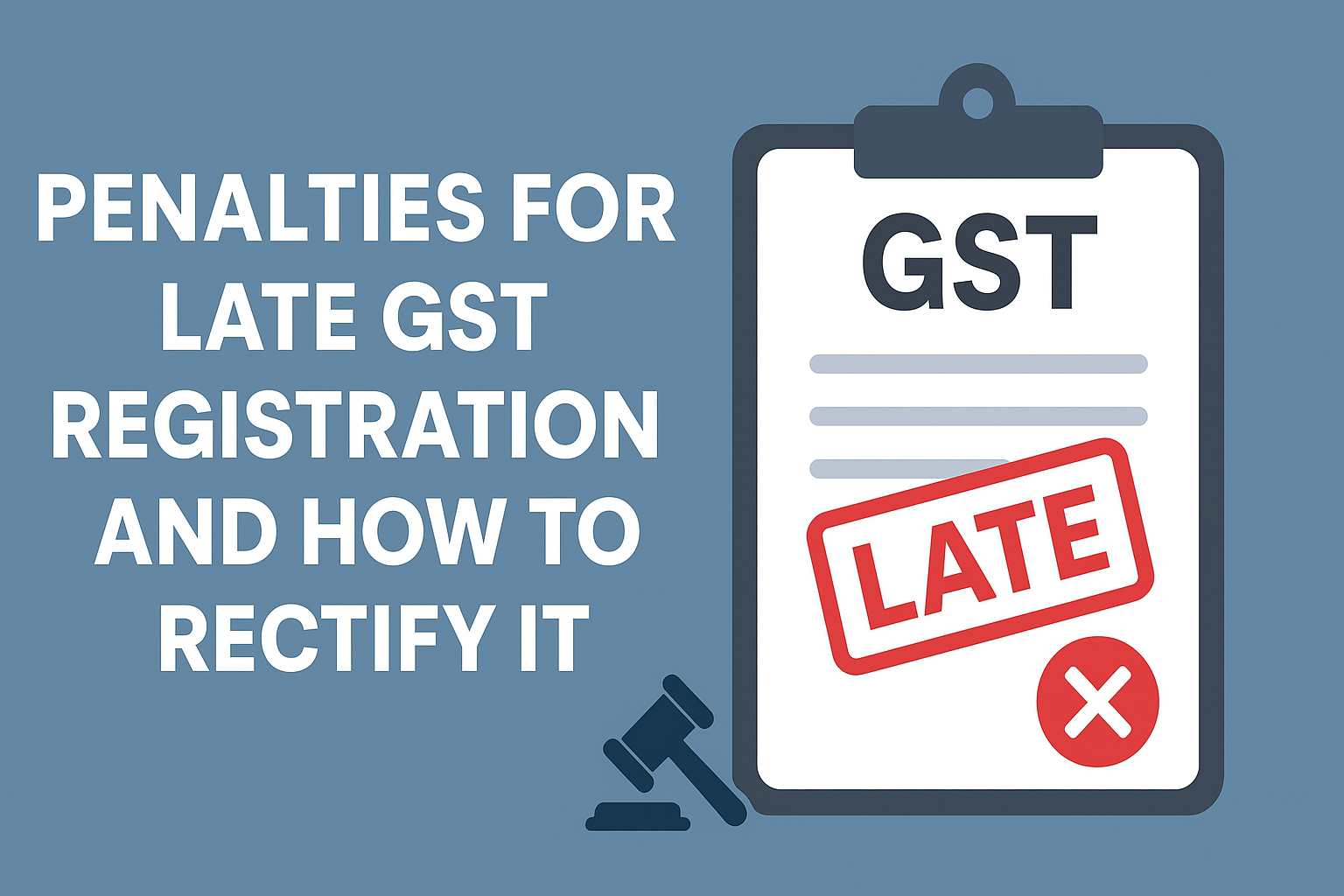Why Timely GST Registration Matters

Penalty for Late GST Registration
Goods and Services Tax (GST) registration is mandatory for every business crossing the prescribed turnover limit under the CGST Act, 2017. Timely registration ensures compliance, enables Input Tax Credit (ITC) claims, and protects against penalties or notices.
However, many small businesses and startups in India—especially in states like Bihar—often delay registration due to lack of awareness or procedural confusion. This article by Advocate Tabish Ahmad explains the penalties for late GST registration and how to rectify such delays effectively.
What is Considered a Late GST Registration?
A late GST registration occurs when a person liable to register under Section 22 or 24 of the CGST Act fails to do so within the prescribed time after crossing the turnover threshold.
If the taxable turnover exceeds ₹40 lakhs (₹20 lakhs for service providers) but the business fails to register, the person is considered unregistered despite being liable and may face penalties, interest, and retrospective tax liability.
Penalties for Late GST Registration under the CGST Act
Section 122 – Penalty for Failure to Register
Under Section 122(1)(xi) and (xii) of the CGST Act, 2017, failure to register when liable attracts a penalty of ₹10,000 or the amount of tax evaded, whichever is higher.
This means that even if no sales are made, the penalty may still apply if turnover exceeds the registration threshold.
Interest Liability on Late Registration
In addition to penalties, interest under Section 50 of the CGST Act is payable on tax dues from the date the liability arose until payment. This applies to cases where the business collects tax without registration or delays payment post-registration.
Consequences of Non-Registration under GST
Loss of Input Tax Credit (ITC): Businesses cannot claim ITC on purchases made prior to registration.
Legal Penalties: Notices and demands under Section 73 or 74 may be raised for tax not paid.
Ineligibility for Compliance Benefits: Certain schemes and refunds are available only to registered persons.
Reputational Impact: Repeated defaults can attract departmental audits or scrutiny.
How to Rectify Late GST Registration
If you have delayed GST registration, immediate voluntary compliance can significantly reduce legal consequences.
Step-by-Step Process to Apply for GST After Due Date
Visit the GST Portal and click on New Registration.
Fill in Basic Details such as PAN, business name, and address.
Upload Required Documents including PAN card, address proof, photographs, and bank details.
Verify via OTP sent to registered mobile and email.
Submit Application (Form GST REG-01) for approval.
Await ARN and Certificate – issued after officer verification under Rule 25, CGST Rules.
Filing Pending Returns and Paying Dues
After receiving the GSTIN:
Calculate tax liability from the effective date of registration.
Pay tax and interest for the delayed period.
File necessary returns (GSTR-1 and GSTR-3B).
This demonstrates voluntary compliance and may help reduce penalties upon representation.
Relief Options and Legal Remedies
Application for Penalty Waiver or Appeal
If genuine reasons exist (technical error, misunderstanding, illness, etc.), one may:
File a representation before the jurisdictional GST officer requesting waiver.
Cite Circular No. 95/14/2019-GST allowing relief in bona fide cases.
If denied, file an appeal under Section 107 within three months.
Case Law Reference:
In M/s ABC Enterprises vs. GST Department (2020), the tribunal allowed partial penalty reduction due to voluntary disclosure and prompt rectification.
Real-Life Example: Business Facing Late Registration Penalty
A small trader from Patna exceeded the ₹40 lakh threshold in FY 2023–24 but registered six months late. The department issued a notice under Section 122. After voluntary registration and payment of tax plus interest, the officer waived 50% of the penalty considering prompt compliance.
Lesson: Timely self-correction reduces long-term financial and legal risks.
Conclusion – Stay Compliant and Avoid Future Penalties
Timely GST registration is not only a legal obligation but also a safeguard against unnecessary penalties and business disruptions.
If you’ve missed the deadline, act fast—register, pay dues, and regularize your compliance.
Facing penalties for delayed GST registration?
👉 Contact Bihar Tax Consultant for expert legal guidance and quick rectification assistance.
Frequently Asked Questions (FAQs)
1. What happens if I register for GST late?
You may face a penalty under Section 122 of the CGST Act and interest on unpaid taxes.
2. Is there any grace period for GST registration?
No formal grace period exists; registration must be done once the turnover crosses the prescribed limit.
3. Can I register for GST after the due date?
Yes, you can register late, but penalties and interest may apply.
4. How much is the penalty for late GST registration?
A flat penalty of ₹10,000 or the amount of tax evaded, whichever is higher, may apply.
5. How can I rectify late registration?
Apply for registration on the GST portal, pay dues, and file returns promptly.
6. Can the penalty for late GST registration be waived?
In certain cases, you can appeal or request waiver citing genuine reasons and voluntary compliance.
7. Does late GST registration affect ITC claims?
Yes, input tax credit may be restricted for periods prior to registration.
8. Who is required to register under GST?
Any business with turnover exceeding ₹40 lakhs (₹20 lakhs for service providers) must register.
References
https://cbic-gst.gov.in – Central Board of Indirect Taxes and Customs
https://gst.gov.in – Official GST Portal
https://indiacode.nic.in – Legal text of CGST Act, 2017
Internal Links:
Author Bio
About the Author – Advocate Tabish Ahmad
Advocate Tabish Ahmad (B.A. LL.B., LL.M., Diploma in Cyber Law – GLC Mumbai) is a Certified Cyber Law Practitioner and practising Advocate at the Patna High Court. He specializes in Cyber Crime, GST Litigation, and Tax Appeals, with extensive experience in representing clients before judicial and quasi-judicial forums.
He serves as President of the Cyber Lawyers Association and is a Member of the Advocates’ Association, Patna High Court. As a Mentor at the Indian Tax Academy and JurisCrack, he guides young lawyers and students in cyber and tax law practice.
Author of several books on Cyber Crimes, Taxation, and GST, Advocate Tabish Ahmad is recognized for his practical insights on digital law, data privacy, and cyber fraud defence.

Advocate Tabish Ahmed
